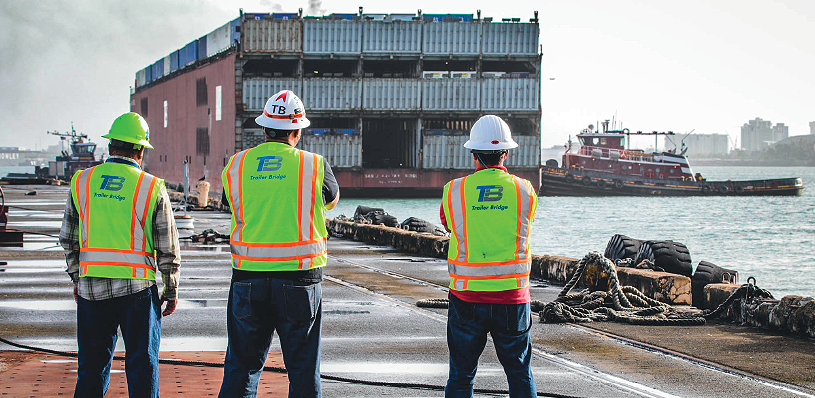
Company care
Transportation costs are one of the top challenges decision-makers face, with last-mile delivery driving the greatest costs in the entire supply chain1. Fuel costs, government regulatory updates, labor issues, cross-departmental decision-making and an economy constantly in flux can wreak havoc on even the most careful executive’s transportation budget.
Today, close to 56 per cent of global companies use automation to some degree and can realistically expect to achieve up to 30 per cent increased production by deploying automation in the manufacturing process2. Is automation the answer to budgeting woes, as well?
I’d argue that while analytics and predictive budgeting software can certainly drive more informed decision-making, it is the people of logistics who power successful transactions and cost savings.
In fact, injecting the process with empathy and love is far more effective at driving precision and predictability in manufacturing budgets. (Did he just say all we need is love? Sort of. Stay with me.)
Automation certainly has its place in manufacturing, where it is being used to improve efficiency while increasing both productivity and yield. US manufacturers face a looming skilled labor shortage, as 22 per cent of skilled workers—some 2.7 million of them—are set to retire by 20253. Automating repetitive processes and incorporating robotics can ease some of that pressure and free skilled workers for more complex, creative tasks.
There are growing opportunities for automation across the full global supply chain, from raw materials management, to picking and packing, to purchase order management payments and invoicing, revenue and goal tracking, GPS-enabled package tracking at the consumer level and more.
In budgeting, though, there are so many logistical variables stressing the process that manufacturers truly benefit from the creativity, experience and voice of the people behind the process. The transportation budget is affected by the decisions of other teams; in fact, this is often where it falls apart.
Misguided attempts to reduce costs by cutting frontline staff can actually have an oversized impact on service and not save that much money. Cutting costs can mean cutting revenue. Operational decisions can add both time and money to the supply chain. Consider purchasing a widget from a vendor offering a lower per unit price than your incumbent, but not factoring in the additional transportation costs incurred because of the greater distance between the supplier and facility.
This is where the right technology platform can help, by affording decision-makers that high-level view of their supply chain as a whole. With that enhanced understanding of each of the moving pieces, you can begin to explore the challenges, pain points, and needs of each person in the supply chain.
And this is where the people of logistics can seriously, positively impact your budgeting and overall transportation costs.
Inboundlogistics.com research cites that 36 per cent of enterprises strongly agreed they rely on their 3PL partners to drive cost reductions and business process improvements. These are the people who understand not only your needs, but those of your customers, the warehousing team, truck drivers, rail or dockyard workers, and more.
There’s no magic bullet to take risk out of the supply chain completely. Every single day, trucks break down, economic and environmental circumstances change, and accidents happen. We cannot eliminate that risk and uncertainty from the transportation budgeting process.
What you can (and must) do is lean on the experience and insight that logistics professionals bring to each transaction. When the highway closes and your shipment can’t move, an app can’t fix that. When a shipment is cancelled and your driver is not without a shipment, the automated phone system can’t do a thing about it. It is the knowledge and motivation of the person on the other end of that call for help that can dramatically change the outcome.
At that point, when any one of 1000 things that could happen has happened, you need a person who cares and is invested to step in – to bring predictability and certainty back into the process. People matter.
You need a person who understands the impact of a failure at Point A on the person awaiting the shipment at Point B, and how that affects the outcome at Point C or D. Just as you need that high-level overview of the challenges stressing your supply chain, you need people working on your behalf who understand the pain points and motivators that will drive improvements in timeliness, safety, and success rate, as well.
Leaving emotion out of decision-making doesn’t mean removing emotion from the business entirely. Yes, we need accurate data on which to base our decisions. From that solid foundation, success comes from people who truly love what they do, caring about the outcome every step of the way.
So back to empathy and love. In today’s world of such uncertainty in our own personal lives, doesn’t your professional supply chain need to be filled with people that care about what your needs are to make your life easier? Showing genuine empathy when the unpredictable happens and simply caring always makes a difference. Love comes in many forms and your supply chain requires it.
Just as skilled workers’ performance is augmented by machinery, transportation professionals and technology work better together – one doesn’t replace the other.
1 The Last-Mile Delivery Challenge, Capgemini Research Institute. Accessed June 21 at https://www.capgemini.com/wp-content/uploads/2019/01/Report-Digital-%E2%80%93-Last-Mile-Delivery-Challenge1.pdf
2 The Effects of Automation on Manufacturing, Production Machining. Accessed June 24 at https://www.productionmachining.com/columns/the-effects-of-automation-on-manufacturing
3 The Skills Gap in U.S. Manufacturing 2015 & Beyond, Deloitte Manufacturing Institute. Accessed June 22 at http://www.themanufacturinginstitute.org/~/media/827DBC76533942679A15EF7067A704CD.ashx
Mitch Luciano
Mitch Luciano is CEO of Trailer Bridge Inc. Trailer Bridge is a privately held, asset-owned leader in the transportation of cargo across land, air, rail, and sea. Exceptional service has earned Trailer Bridge the #1 Ocean Carrier ‘Quest for Quality’ award and recognition as an Inc Best Workplace in America, as well as #1 Best Place to Work in Jacksonville. Headquartered in Jacksonville, FL, its 200 employees work from 17 offices across North America.
www.trailerbridge.com